Unlocking Joy: The Power of Outdoor Musical Adventures for Seniors
Senior Friendly Sensory Gardens
Incorporating sensory gardens and outdoor musical instruments into senior care facilities can improve residents' satisfaction and quality of life. These gardens provide a range of sensory experiences with different colors, scents, textures, and sounds, creating a peaceful environment for residents and their visitors. They are carefully designed to be accessible and engaging for those with visual or hearing impairments, featuring diverse plants, accessible paths, and water features to create a tranquil atmosphere.
Sensory gardens encourage physical interaction through tactile elements, and aromatic plants can support reminiscence therapy. Visual elements keep the senses engaged, which is beneficial for visual health. Additionally, these gardens promote social interaction and relaxation through community activities such as music sessions or gardening clubs, fostering a sense of belonging.
These gardens are valuable resources, offering not only beautiful spaces but also health, social, and emotional benefits, especially for seniors with dementia. Thoughtfully designed sensory gardens can significantly enhance the quality of life in senior care settings.
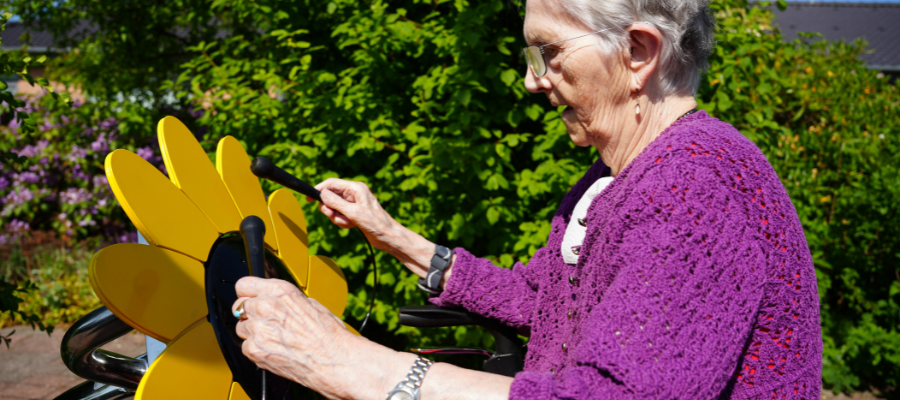
The Enchantment of Sound Gardens in Senior Living Facilities
Music plays a vital role in our lives and is essential to any sensory environment. A new trend in senior living facilities is the creation of sound gardens. These gardens combine the benefits of a sensory garden with outdoor musical instruments. Building a sound garden for the residents will engage their senses and allow them to have fun and explore the outdoors in a new and exciting way. Music has the power to motivate, enrich, touch, relax, and energize seniors in care. A harmonious sound garden can create an interactive outdoor soundscape that pleases the eye and enchants the ear. A sensory sound garden is a multi-generational attraction that entices residents and even young visitors to the outdoors throughout the year to play the instruments. It's hard not to interact with others in a sound garden who are experimenting with the different sounds created by the instruments.
Visitors to the garden can experience and compare the sounds made by different materials. Instruments made of timber produce pure and natural sounds with a full and rich tone that is low in pitch and pleasing to the ear. Alternatively, instruments with notes made of metal produce a higher-pitched, resonant sound that is clear and vibrant. Outdoor musical instruments tuned to the pentatonic scale are easy to play because all the notes harmonize, meaning that even non-musical individuals can pick up a mallet and play, creating new melodies each time without any discordant notes. On the other hand, diatonic instruments such as the Rainbow Cavatina allow more experienced players to play familiar tunes, unlocking memories and talents. For those with no music knowledge, these instruments can be accompanied by a Music Book where the bright, colorful anodized notes on the instruments correspond with the colored notes on the high-pressure laminated music sheets, enabling players to follow the colors to play a well-known song. This creates a fun music-making experience while also encouraging hand-eye coordination. Maintaining or enhancing hand-eye coordination in senior years is key to retaining independence, ensuring safety, and fostering mental and physical well-being.
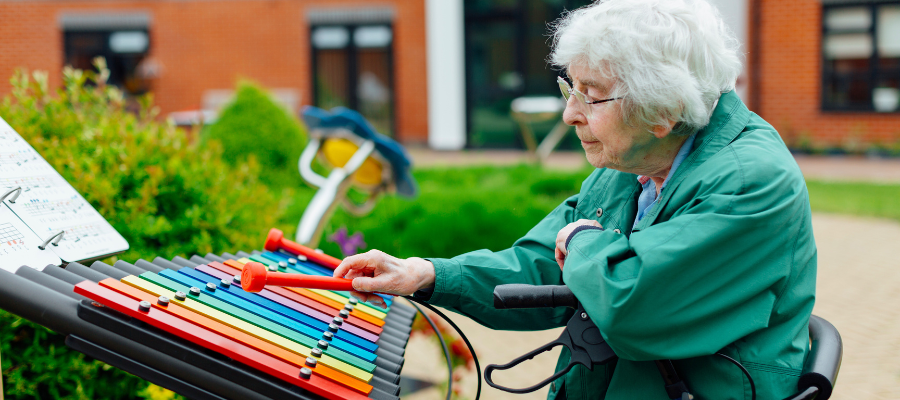
Sound Gardens: Enhancing Well-Being, Mental and Cognitive Health
Music plays a profound role in enhancing mental health among older adults, offering a wide range of psychological benefits beyond alleviating agitation, anxiety, and depression. Its impact on mental health is substantial, providing emotional relief, boosting mood, and fostering a sense of peace and well-being.
When seniors engage with music, whether listening, singing, or playing instruments, they tap into emotional memories and experiences, which can be particularly therapeutic for individuals with Alzheimer's and other forms of dementia. Music can evoke positive memories and emotions, bringing comfort and reducing feelings of isolation or loneliness.
Moreover, making music in a group setting promotes social interaction and cohesion, combating the effects of social isolation. This sense of belonging can significantly improve mood and overall mental health.
Music therapy also provides an outlet for expression. Seniors facing emotional difficulties or cognitive challenges may find it easier to express their feelings and experiences through music than words. This form of expression can be incredibly liberating and therapeutic, fostering a sense of achievement and self-worth.
Furthermore, engaging with music can decrease the stress hormone cortisol, leading to relaxation and a reduction in stress levels. The soothing power of music can counteract the effects of chronic stress, promoting a more relaxed, peaceful state of mind.
In addition to these benefits, music enhances brain function. Listening to or playing music stimulates different areas of the brain, improving cognitive functions such as focus, memory, and attention. This cognitive stimulation is crucial for older adults, as it can help slow the decline of cognitive functions and contribute to a more vibrant, engaged mental state.
Overall, the mental health benefits of music in senior care are significant and diverse. Through its ability to soothe, stimulate, and enrich, music supports not only the psychological well-being of older adults but also their cognitive health, social connections, and quality of life.
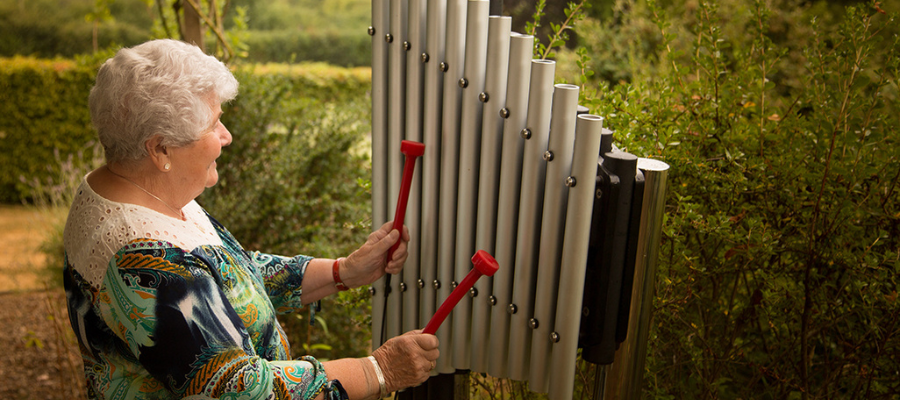
Fostering Community Through Outdoor Musical Instruments
Understanding the significance of engaging in activities in a nursing home is vital for the well-being of residents, visitors, and staff. Activities bring life and excitement, preventing boredom. A musical sound garden is an outstanding choice for activity directors eager to blend music into their offerings. Music's charm allows it to connect across languages, cultures, and abilities, serving as a powerful means for self-expression and socialization. Additionally, music enhances concentration, mobility, coordination, and relaxation while easing tension.
A sound garden offers a therapeutic ambiance and encourages interaction with the environment. It's an enjoyable and inclusive attraction for visitors of all ages, allowing residents and their families to make music together.
Outdoor musical instruments create engaging experiences, fostering social connections in care settings. These instruments are designed for accessibility, encouraging communal gatherings for music-making. This activity strengthens bonds, enhances communication, and bridges gaps between groups. It provides seniors with a joyful form of expression, offers carers a pleasant activity to share with those in their care, and enriches visits for family and friends. Promoting unity and mutual respect, the inclusive nature of these musical sessions benefits participants of all ages and abilities. Engaging in outdoor music bolsters a sense of community, enriching and enhancing social connections.
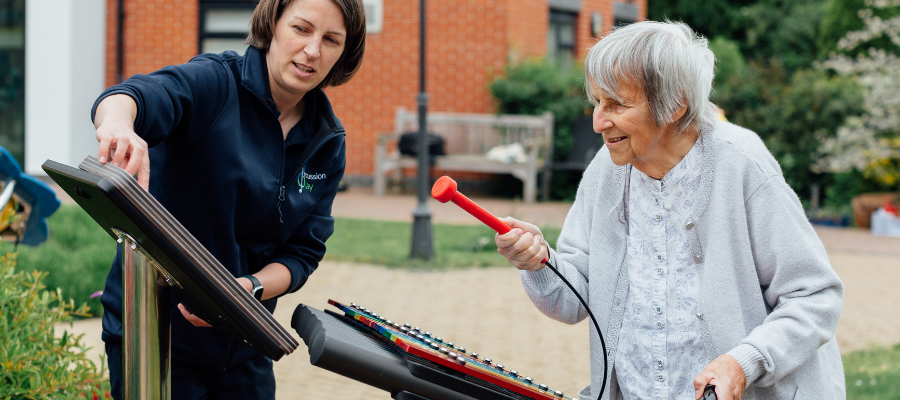
Designing a Sound Garden for Senior Physical Activity
Designing outdoor areas to include musical activities is a great way to encourage physical activity. The incorporation of a music garden or trail not only enriches the sensory experience for seniors but also offers considerable physical benefits. Engaging with the instruments, such as beating drums or stroking chimes, naturally encourages gentle movements that can improve flexibility, coordination, and muscle strength. These physical activities, though light, are essential in maintaining the range of motion and reducing the risk of stiffness or joint pain. Moreover, navigating the garden paths to explore different sound stations promotes walking, a fantastic cardiovascular activity. Walking in such a stimulating environment also enhances balance and mobility, which are crucial factors in preventing falls. Thus, the music garden is a source of relaxation and pleasure and a gentle fitness enhancer, subtly encouraging seniors to adopt a more physically active lifestyle.
Playing outdoor musical instruments can also have several physical benefits for seniors. For one, it can help improve their motor skills and hand-eye coordination as they use their hands and fingers to manipulate the instrument. Additionally, playing musical instruments can help strengthen the arms, shoulders, and back muscles, which is particularly beneficial for seniors who struggle with mobility or have limited range of motion. Furthermore, playing musical instruments outdoors can provide seniors with much-needed exposure to sunlight, which can help boost their vitamin D levels and promote bone health.
A sound garden is more than just green space. It is a therapeutic and interactive tool that engages residents in activities that create soothing sounds, encourage self-expression, support social interactions, and improve cognitive skills. Imagine sculptures and musical instruments placed alongside wheelchair-friendly paths that motivate residents to go outdoors and enjoy the open air.
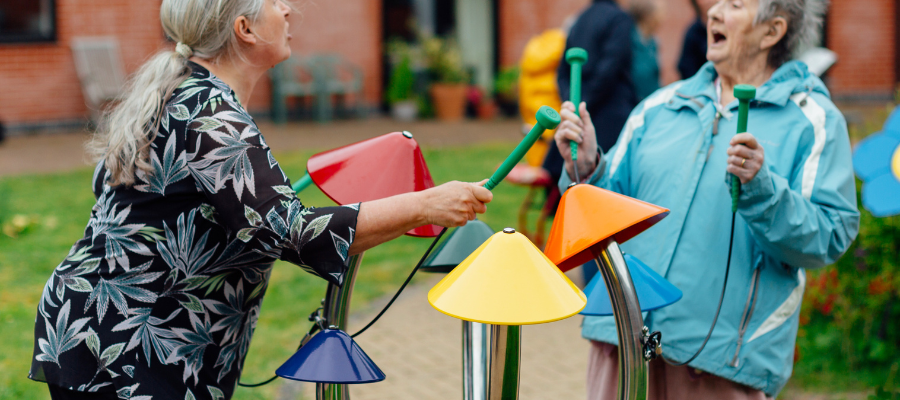
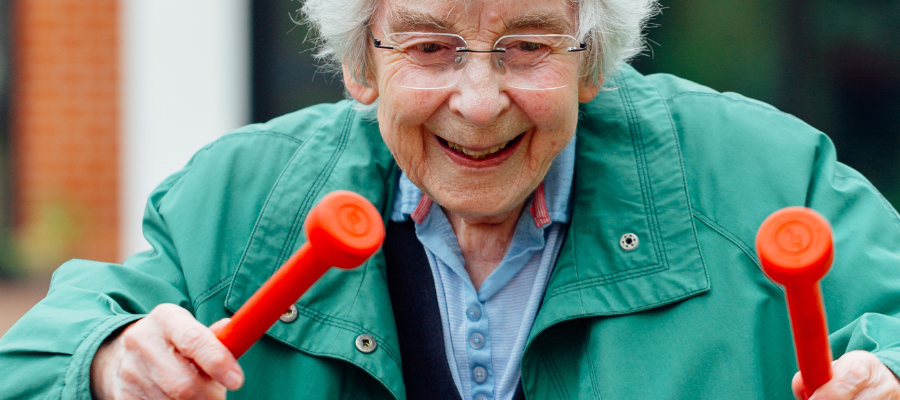
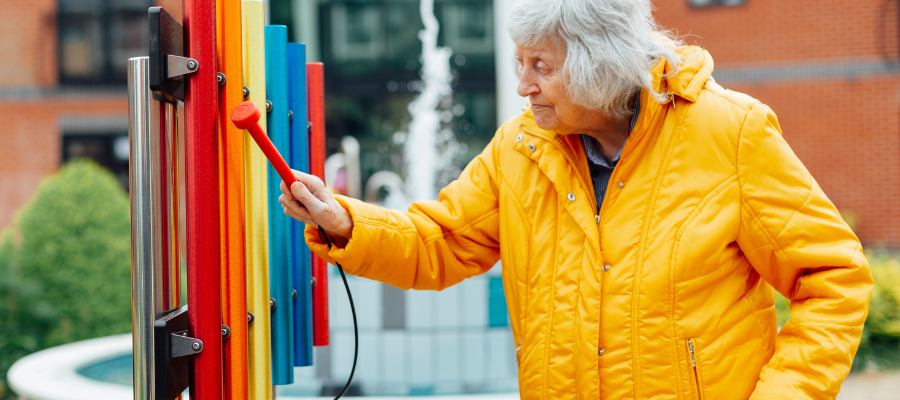
Further Information and Reading
White Papers:
Percussion Play has written White Papers that highlight the benefits of outdoor music-making for seniors.
Young at Heart: The Benefits of Music and Outdoor Play For Older Adults
Music For Mood and Memory - The Benefits of Music For People Living With Alzheimer's
Case Studies:Would you like to see examples of senior projects we've completed for inspiration? Our Case Studies provide a great starting point.
Laclede Groves' Harmony Garden Creates a Musical Conversation
Inspired by Dutch Counterparts, London-based Senior's Housing and Care Trust Encourages Outdoor Musical Engagement
Retirement Village Creates Denmark's Largest Music Garden
Retirement Community Creates 'Sensory Accessibility Path' Ontario, Canada
Elder Care Centre Invite Music and Children Into Their Garden
Podcast:
How can making music in the great outdoors support our senior communities? This episode explores how one elder care community benefits from a music garden and delves into music's impact on cognition, mental health, and physical health. Doctors and researchers will explain their pioneering and latest research, and we will also learn why Denmark is a world leader in senior care, embracing music as a tool to create engaging and happy environments.
Music Made For The Great Outdoors Podcast: Music & Senior Care - The Benefits
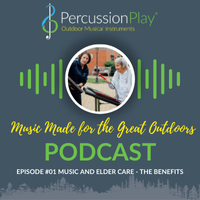
Infographic:
Download our Fun Infographic - The Benefits of Music for Seniors
Video:
The video below is a collection of short videos in numerous care homes and elder centers where outdoor musical instruments have proven beneficial and fun.
{}